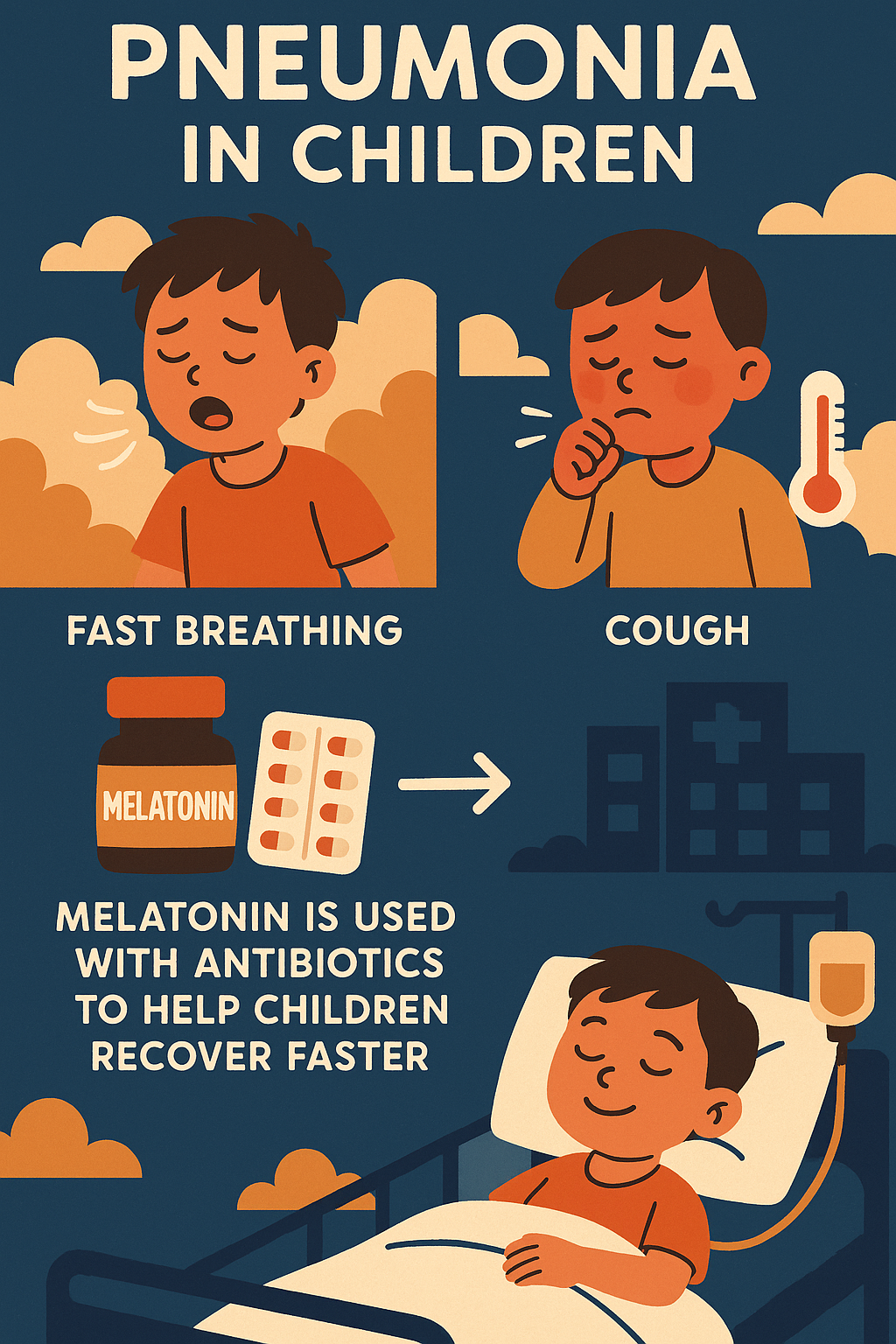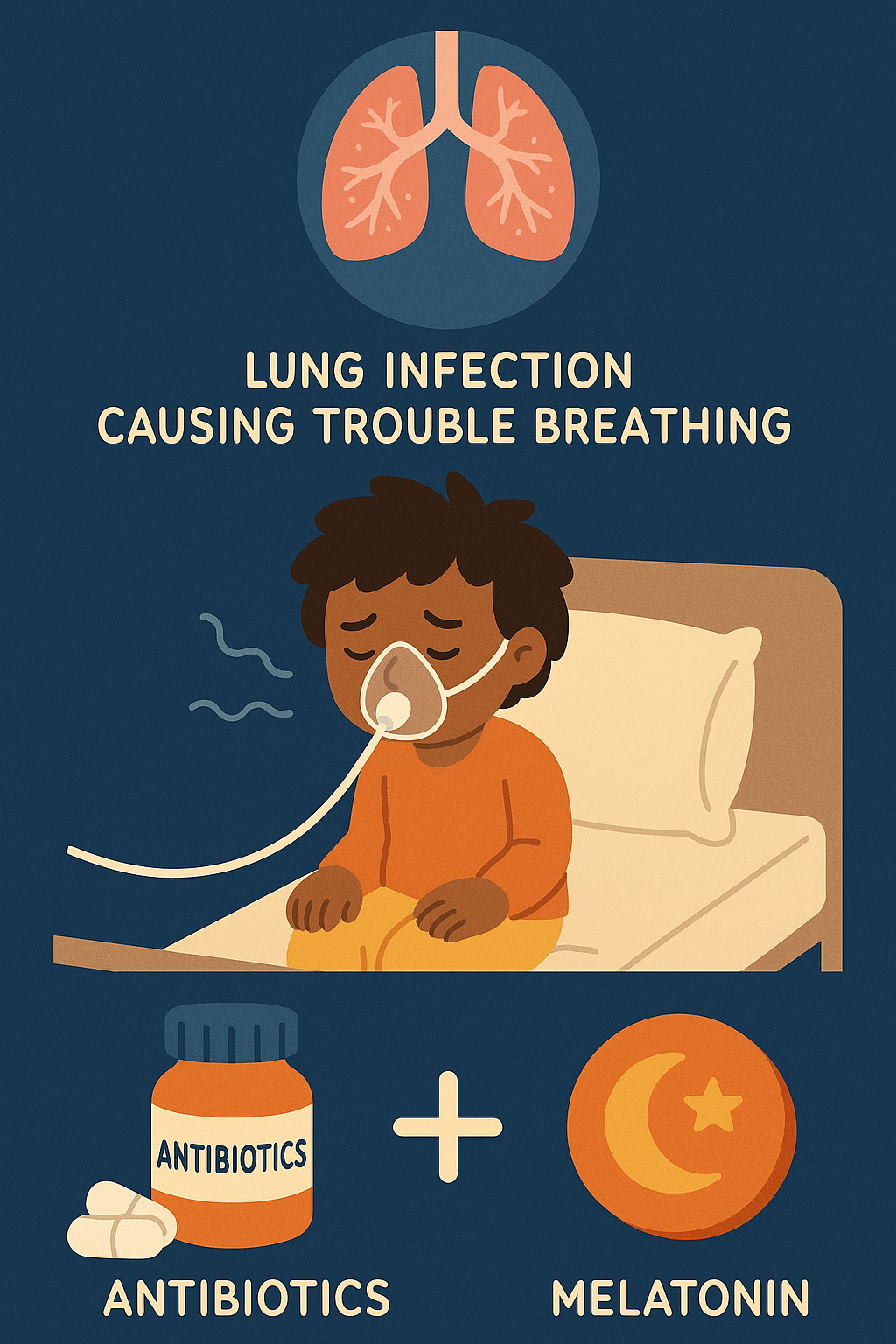Key Takeaways
- Pneumonia is a lung infection that often causes cough, difficulty breathing, and
fever in children.
- Treating pneumonia quickly and properly can help children recover faster and
avoid serious complications.
- Clinical trials offer access to emerging treatments and expert care that may not
be available elsewhere.
- Joining a Pneumonia Childhood trial can help advance research while potentially
improving your quality of life with supervised support.
A New Horizon in Childhood Pneumonia Research
Clinical trials are essential to finding better treatments and improving health outcomes. This spotlight
focuses on the Role of Melatonin as an Adjuvant Therapy in Childhood Pneumonia trial (NCT06949904). This study
aims to explore how melatonin, a natural hormone, might help children with pneumonia recover faster when added
to standard treatments.
Understanding new research is a top priority for patients and caregivers seeking information on treatment
options, managing side effects, and exploring potential avenues for improvement. This post aims to provide a
clear overview of what this trial is about and how it could potentially impact the future of Pneumonia
Childhood care.
Understanding Childhood Pneumonia and the Need for Better
Treatments
Pneumonia is a common lung infection in children that causes inflammation and makes it hard to breathe.
Despite existing treatments like antibiotics, pneumonia can still cause long hospital stays and serious
illness in some kids. The Melatonin Pneumonia Trial is exploring if adding melatonin, which has properties
that might help the body heal, can shorten hospital stays and improve recovery. Recognizing pneumonia symptoms
early helps ensure children get the care they need promptly.
Curated Facts and Expert Data
centerwatch.com: This ongoing clinical trial is testing if giving children with pneumonia extra melatonin,
along with their regular antibiotics, can help them recover faster and shorten their hospital stay. The
trial includes kids from 1 month to 12 years old and compares those getting melatonin for 14 days plus
regular treatment to those only getting regular treatment.
[1].
journals.lww.com: This study looked at children with sepsis (a serious infection), and found that melatonin,
when added to usual antibiotics, helped lower specific inflammation levels in the blood (IL-6 and IL-8) and
led to better health outcomes compared to antibiotics alone.
[2].
Childhood Pneumonia Symptoms
Pneumonia Childhood can manifest in various ways, but some of the most common symptoms include:
- Fast or difficult breathing
- Cough
- Fever
- Chest in-drawing (when the chest moves inward during breathing)
- Reduced appetite or trouble feeding
- Lethargy or low energy
- Bluish color around lips or face (cyanosis)
These symptoms can make it hard for children to play, eat, and breathe comfortably. Treating pneumonia
effectively is important to help children feel better and avoid complications, which is why research like the
Melatonin Pneumonia Trial is crucial.
Introducing the Trial’s Focus: Melatonin as an Add-on
Treatment
The Melatonin Pneumonia Trial is testing whether melatonin, given along with the usual antibiotic treatment,
can help children with pneumonia get better faster.
What is Melatonin?
Melatonin is a natural substance your body makes to help control sleep and support the immune system. In this
study, doctors are seeing if giving melatonin as a medicine helps children’s lungs heal faster when fighting
pneumonia.
This study is designed to find out if melatonin added to standard antibiotics is safe and helps reduce the
number of days children stay in the hospital with pneumonia.
Mechanism of Action
Melatonin works as an antioxidant, which means it helps protect the body's cells from damage during
infections. It also helps improve the body's natural defenses and may reduce inflammation in the lungs,
potentially helping children recover faster from pneumonia.
Giving melatonin as an extra treatment might shorten hospital stays by helping the body heal more quickly,
which can improve comfort and reduce medical costs for families.
Trial design
This study randomly assigns children to either standard treatment alone or standard treatment plus melatonin.
Neither the families, doctors, nor study assessors know who gets melatonin, ensuring the study is fair and the
results reliable.
Why is this Trial Important for Patients?
The Melatonin Pneumonia Trial embodies this crucial role in research, offering a potential path to:
-
Shorter hospital stays and faster recovery for children with pneumonia by testing melatonin as an additional
treatment.
-
More comfortable and less stressful treatments for children, possibly making hospital time easier for both
patients and families.
-
Better understanding of how melatonin might help lung infections, which may lead to improved treatments for
pneumonia in the future.
Who Can Participate? Eligibility at a Glance
Clinical trials have specific criteria to ensure the safety of participants and the validity of the study
results. For the Melatonin Pneumonia Trial trial, key eligibility criteria
include:
- Age: 1 month to 12 years
- Gender: Both boys and girls can participate
- Diagnosis: Children must be diagnosed with pneumonia or severe pneumonia following the World Health
Organization definition
- Exclusions: Children recently hospitalized within 14 days, exposed to tuberculosis, with active chickenpox
or herpes infections, allergic to melatonin, currently taking melatonin, or with other significant medical
conditions affecting organs like lungs, heart, immune system, liver, brain, or nerves
What to Expect as a Participant
If you join the Melatonin Pneumonia Trial, here is what you can expect:
-
Screening: A series of tests and evaluations to confirm your eligibility at no cost.
-
Treatment Period: Your child will receive standard antibiotic treatment. Some children will also take
melatonin as a medicine three times a day for 14 days, all at no cost.
-
Monitoring: Doctors and nurses will regularly check your child's health and monitor for any side effects
during the hospital stay and follow-up period. They will make sure your child is safe and improving.
-
Follow-up: After treatment, there will be assessments to see how your child is doing to ensure full
recovery.
The duration of your participation will vary depending on the study design, but the research team will explain
the full commitment before enrollment.
Potential Risks and Benefits
Like all medical interventions, participation in a clinical trial carries both potential benefits and risks.
Potential Benefits:
- Access to a new treatment before it’s widely available.
- Close monitoring by a team of medical experts.
- Contributing to medical knowledge that could help future patients with Pneumonia Childhood.
Potential Risks:
- The new treatment may not be effective for you.
- While melatonin is generally safe, there may be unknown or rare side effects. The study team will watch
carefully and provide support as needed.
- The time commitment for study visits and procedures.
A detailed explanation of all potential risks and benefits will be provided during the informed consent
process.
How to Learn More and Get Involved
The Melatonin Pneumonia Trial (NCT06949904) is currently recruiting patients at Pakistan Institute of Medical
Sciences in Islamabad, Pakistan.
If you are interested in potentially participating, it is crucial to discuss these criteria with your
healthcare provider. They can determine if you meet the specific requirements. You may share this link with
your provider’s email address, or have them visit ClinQuestAi.com and type in NCT06949904.
You can also:
- Contact the study coordinator, Dr. Mian Muhammad Hassan Ahmed, at Pakistan Institute of Medical Sciences,
Islamabad. Phone: +92-308-8819982, Email: Hassan965990@gmail.com
Remember: Deciding to participate in a clinical trial is a personal choice. It’s important to discuss all
aspects of the trial with your healthcare provider to ensure it’s the right decision for your individual
health situation.
Further Reading:
Our Commitment to Accuracy and Trust
All health-related content on this website, whether drafted by our team or with AI assistance, undergoes a
rigorous human review process before publication. Every article is fact-checked, edited, and medically
reviewed by a licensed medical professional with relevant expertise. Our goal is to provide information that
is accurate, aligned with current medical consensus, empathetic, and useful for patients and caregivers. We
are committed to transparency, clearly citing sources and displaying author and reviewer credentials to uphold
the highest standards of E-E-A-T (Experience, Expertise, Authoritativeness, and Trustworthiness).

